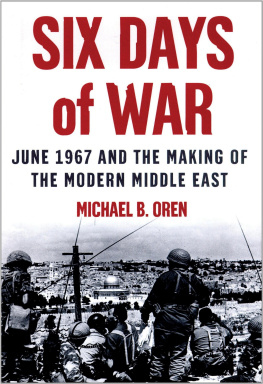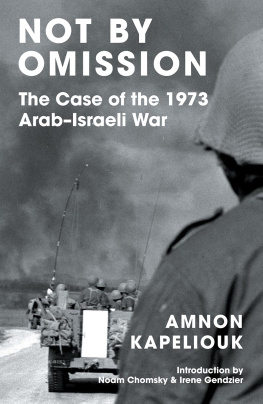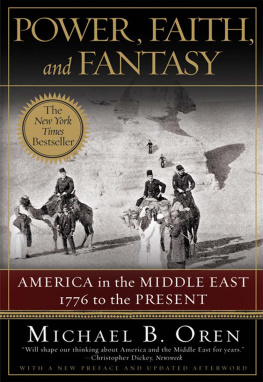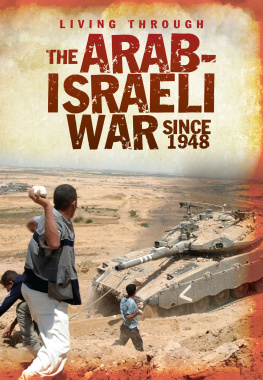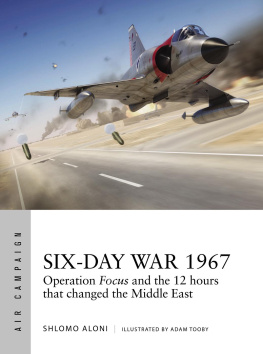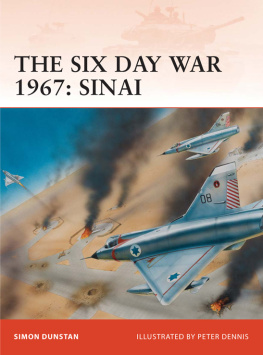Six Days of War
June 1967 and the Making of the Modern Middle East
Michael B. Oren
For my wife, Sally,
and for Our childrenYoav, Lia, and Noam.
Each We seized for his sin and against some We unleashed a storm. Some were seized by the cry and some the earth swallowed and some We drowned. God would never wrong them, but they wrong themselves.
The Quran, 29:39
But though they roar like breakers on a beach, God will silence them. They will flee like chaff scattered by the wind or like dust whirling before a storm.
Isaiah, 17:13
Contents
ACKNOWLEDGMENTS
T HOUGH MY NAME APPEARS as the author of this book, and I take sole responsibility for its contents, Six Days of War represents the efforts, the expertise, and the dedication of many esteemed individuals.
I wish to thank, firstly, those archivists and archival assistants who facilitated my research at various libraries around the world: Regina Greenwell at the Lyndon B. Johnson Presidential Archive; Patrick Hussey in Washington, D.C.; Michael Helfand at the UN Archive in New York; Alexey Kornilov and Masha Yegorova in Moscow; Gilad Livne and Eliahu Shlomo at the Israel National Archives; Michael Tzur at the IDF Archives, Col. Yoram Buskila and Capt. Michal Yizraeli at the Israel Air Force Historical Wing.
Throughout the research and writing of the book, I received invaluable input from fellow scholars. Thanks are due to Ambassador Richard B. Parker, scholar-in-residence at the Middle East Institute, Yigal Carmon, President of MEMRI, Dr. Abdel Monem Said Aly, Director of the Al-Ahram Center for Political and Strategic Studies, Zaki Shalom of Ben-Gurion University, Eyal Sisser of the Dayan Center of Tel Aviv University, and Dan Schueftan, Arie Morgenstern, and Rabbi Isaac Lifshitz, all of the Shalem Center. Thanks to Eran Lerman for his critical reading of the text. I wish to express special gratitude to two colleagues whose advice and support have seen me through the many vicissitudes of this projectto Hebrew University Professor Avraham Sela and to Mor Altschuler, also of the Shalem Center.
For feedback on my writing, suggestions on phrasing and sources, and the occasional morale boost, I was able to turn to a number of knowledgeable friends,
among them Yossi Klein Halevi, Jeremy Herman, Sharon Friedman, Matthew Miller, Jonathan Karp, John Krivine, Joseph Rothenberg, Danny Grossman, Isabella Ginor, Kenneth Weinstein, Zion Suliman, the Hon. A. Jay Cristol and, as always, Jonathan Price and Naomi Schacter-Price. I warmly thank them all.
I have been blessedit is the only word for itwith a team of committed and talented research assistants without whom this book could not have come to life. My deepest appreciation goes to Moshe Fuchsman, Yemima Kitron, Elisheva Machlis, and Alexander Pevzner. Thanks are also due to editorial assistants Aloma Halter and Michael Rose, and to graphic artist Batsheva Kohay. I am particularly indebted to Noa Bismuth, whose devotion, energy, and skills proved utterly indispensable.
I want to warmly thank my editor, Peter Ginna, for his unswerving commitment to this book, and to the others at Oxford University PressTim Bartlett, Helen Mules, Sara Leopold, Furaha Norton, Kathleen Lynch, and Ruth Manneswho patiently saw it through publication. Thank you, too, Glenn Hartley, head of Writers Representatives, my excellent agent.
The book is dedicated to my family, my wife and children, for whom no mere acknowledgement can suffice. The same holds for my parents, Marilyn and Lester Bornstein, and my sisters, Aura Kuperberg and Karen Angrist, and their husbands.
I wish also to thank my family at the Shalem Center, the educational and research institute where I am a Senior Fellow, and under whose auspices this book was researched and written. To those staff members who aided me in myriad ways, to Marina Pilipodi, Rachel Cavits, Naomi Arbel, Carol Dahan, Dina Blank, Yehudit Adest, Biana Herzog, Laura Cohen, Dan Blique, Michal Shaty, Anat Tobenhouse, Einat Shichor, Ina Tabakthank you all. My appreciation goes to David Hazony and Josh Weinstein, on whose sage advice I have often relied, and to Yishai Haetzni and Shaul Golan, the executives who shared with me the vision of this book and so often made the impossible happen. Special gratitude is reserved for Daniel Polisar, the Academic Director of Shalem, who stood behind this project from inception to publication, and to our indefatigable publicist, Deena Rosenfeld-Friedman. The members of the Shalem Board of Trusteesand especially Allen H. Roth and William Kristol are thanked for their unflagging support and advice. Finally and most ardently, my thanks go to Yoram Hazony, President of Shalem, and to the head of its Board, Roger Hertog, for their generosity, their inspiration, and leadership.
The 1967 war is, at base, a saga not of books and documents, but of people, many of whom I have had the pleasure and honor to meet. To exceptional individuals such as Abba Eban and Miriam Eshkol, Indar Jit Rikhye, Muhammad al-Farra and Suliman Marzuq, Joseph Sisco, the Rostow brothers, Eugene and Walter, Eric Rouleau and Vadim Kirpitchenko, I can only say that I owe you a great deal, and so does history.
A NOTE ON SOURCES AND SPELLINGS
M ANY AND DIVERSE SOURCES were employed in the writing of this book. The bulk of the research is based on diplomatic papers from archives in North America, Britain, and Israel, observing the thirty-year declassification rule. The protocols of Israeli Cabinet meetings remain for the most part classified, however, as do all but a segment of Israel Defense Forces papers. Archives in the Arab world are closed to researchers, though several private collectionsCairos Dar al-Khayyal, for exampleare accessible. Also, a significant number of Arabic documents fell into Israeli hands during the war, and can be viewed at the Israel Intelligence Library. Russian language documents are, in theory, available at archives in Moscow, though these are poorly maintained and highly limited in their holdings. The French files from 1967 have not yet been released to the public.
In the notes, names of archives are abbreviated as follows:
| BGA | Ben-Gurion Archives |
| FRUS | Foreign Relations of the United States |
| IDF | Israel Defense Forces Archives |
| ISA | Israel State Archives |
| LBJ | Lyndon Baines Johnson Presidential Library |
| MPA | Mapai Party Archives |
| NAC | National Archives of Canada |
| PRO | Public Record Office (FO=Foreign Office, CAB=Cabinet Papers, PREM=Prime Ministers Office) |
| SFM | Soviet Foreign Ministry Archives |
| UN | United Nations Archives |
| USNA | United States National Archives |
| YAD | Yad Tabenkin Archive |
Oral history interviews represent another important source for the book. The majority of these were conducted by the author, though in several highly sensitive cases, the author provided written questions to a research assistant who, for reasons of personal security, wished to remain anonymous. I have attempted to interview as many of the wars principal figures as possible. Several, such as Gideon Rafael and Kings Hussein and Hassan, passed away during the course of my research; othersAriel Sharon and Yasser Arafat, for exampledeclined to be interviewed.
Transliteration, particularly in Arabic, presents a formidable challenge, as names often have both popular and literary spellings. For claritys sake, preference is given to the former. Thus: Sharm al-Sheikh rather than Sharm al-Shaykh, Abu Ageila and not Abu Ujayla. Personal names are also formally transliterated except in cases in which the individual was accustomed to a specific spelling of his or her name in English. Some examples are Gamal Abdel Nasser (instead of Jamal Abd al-Nasir), Yasser Arafat (Yasir Arafat), and Mohammad El Kony (Muhammad al-Kuni). Many place namesCairo, Jerusalem, Damascushave been preserved in their English equivalents, rather than in the original Arabic or Hebrew.

